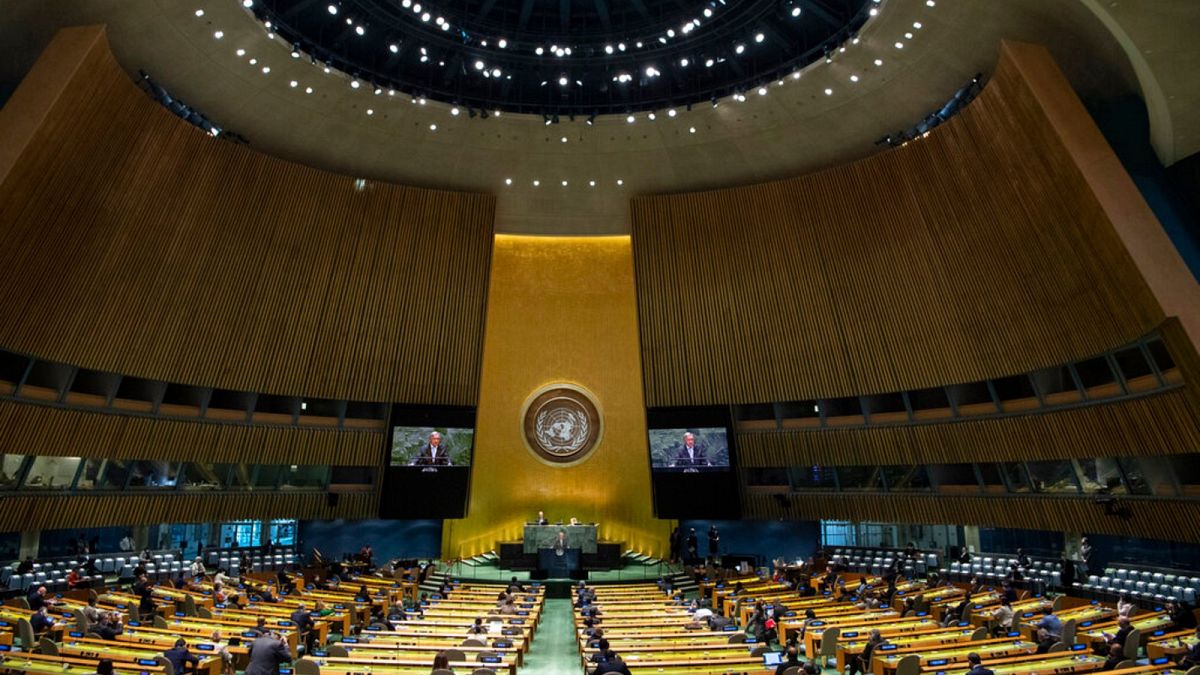It came as Donald Trump used the virtual UN meeting to attack China over the emergence of coronavirus. China hit back at what it called "a political virus" and said Trump's accusations were "baseless".
The world is facing an "epochal" health crisis, the biggest economic calamity since the Great Depression and the threat of a new Cold War between the United States and China, the United Nations' secretary-general warned on Tuesday.
Addressing a nearly empty General Assembly Hall in New York, Antonio Guterres pleaded for unity and a global ceasefire in the face of the coronavirus pandemic. He cautioned that COVID-19 was not just a "wake-up call", but a "dress rehearsal" for challenges to come.
"COVID-19 has laid bare the world’s fragilities: rising inequalities, climate catastrophe, widening societal divisions, rampant corruption. The pandemic has exploited these injustices, preyed on the most vulnerable and wiped away the progress of decades," Guterres said.
"People are hurting, our planet is burning," he added.
In his opening speech, Guterres said the UN was at a "foundational" moment, facing the same kind of challenges it had when it was created 75 years ago.
"Those who built the United Nations 75 years ago had lived through a pandemic, a global depression, genocide and world war," Guterres said. "Today, we face our own 1945 moment."
'We are moving in a very dangerous direction'
Days after the pandemic shut down big parts of the world in March, Guterres called for a global cease-fire to tackle it. On Tuesday, he appealed for a 100-day push by the international community, led by the Security Council, “to make this a reality by the end of the year”.
“At the same time, we must do everything to avoid a new Cold War," Guterres added.
Reiterating a warning he made to world leaders a year ago about increasing US-China rivalrly, Guterres said, “We are moving in a very dangerous direction.”
“Our world cannot afford a future where the two largest economies split the globe in a Great Fracture — each with its own trade and financial rules and internet and artificial intelligence capacities,” Guterres said. “A technological and economic divide risks inevitably turning into a geo-strategic and military divide. We must avoid this at all costs.”
The rivalry between the two powers was in full display as US President Donald Trump began his very short virtual speech attacking “the China virus.” He urged the United Nations to hold Beijing “accountable” for failing to contain COVID-19, which originated in China and has killed 200,000 Americans and nearly 1 million around the world.
Soon after, China's ambassador rejected all accusations against Beijing as baseless.
“At this moment, the world needs more solidarity and cooperation, and not a confrontation," UN Ambassador Zhang Jun, sitting in the General Assembly chamber, said before introducing President Xi Jinping’s pre-recorded speech. “We need to increase mutual confidence and trust, and not the spreading of political virus. China resolutely rejects the baseless accusation against China."
'Diplomacy doesn't happen on Zoom'
But around the world, rising nationalism and populism are making it increasingly difficult to argue for multilateral cooperation, said Thomas G. Weiss, a professor at the City of New York Graduate Centre and a distinguished fellow in global governance at the Chicago Council on Global Affairs.
"It's not just Trump. It's Xi, it's Putin, it's Bolsonaro, Duterte, and the list goes on. (They) are all arguing for 'me first': America first, China first, Russia first, Brazil first," he told Euronews.
The virtual format of this year's General Assembly, where world leaders' prerecorded speeches are played out in a nearly empty hall, also seriously impairs the workings of diplomacy.
"What you might describe as diplomatic speed dating will not occur this year," Weiss said.
"The kinds of informal conversations that might put down the fire between Beijing and Washington, or build bridges (...), those conversations do not occur on Zoom or Skype, they only occur behind the scenes in person. So those will not occur at all."
Watch highlights of the interview in the video player above.
